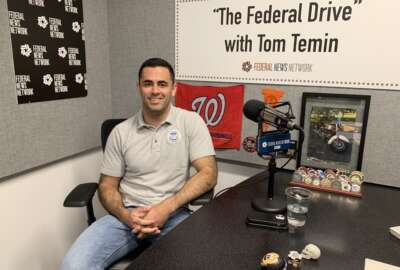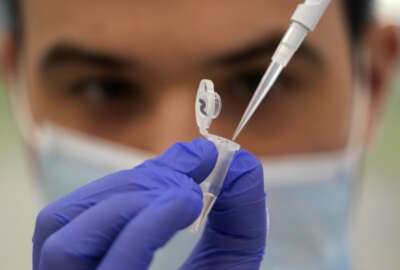
Crime and terror victims get compensation thanks to this federal career leader
Carolyn Hightower has devoted her career to helping others. Specifically helping victims of terrorism and crime. Today, she's deputy director of the Office on...
It sounds cliché to say someone has devoted a career to helping others, but my next guest has literally done that. Specifically helping victims of terrorism and crime. Among her accomplishments is drafting the original policy for the International Terrorism Victim Expense reimbursement program out of the Justice Department. Today, she’s deputy director of the Office on Trafficking in Persons, part of the Health and Human Services Department. And she’s a finalist in this year’s Service to America Medals Program. Carolyn Hightower joins Federal Drive with Tom Temin now.
Interview Transcript:
Tom Temin And it sounds like you have had indeed an interesting career. Just give us the 60-second outline of what you’ve done in 40 years of federal service.
Carolyn Hightower Wow. That’s quite a challenge. Well, I came into federal service as a presidential management fellow. At that time the program was the PMI program, Presidential Management internship program. I had the great opportunity to join the Department of Justice in a brand new office, the Office for Victims of Crime, which was established after the passage of the Victims of Crime Act of 1984. And I spent 23 years there basically working on developing programs and services for individuals who experience probably the worst incident of their lives, working with programs that assist victims of domestic violence, sexual assault, child abuse. And those were the priority areas outlined in the Victims of Crime Act. But after the Oklahoma City bombing, Congress basically passed legislation to support the response to cases of terrorism. And as a result, our office had that responsibility added in addition to focusing on domestic violence, sexual assault and child abuse.
Tom Temin Sure. And we should just remind people that might be a little bit newer to the market that that Alfred P Murrah Building bombing in Oklahoma City was 1995 during the Clinton administration. And until 9/11, it was the biggest domestic terrorism occurrence ever, correct?
Carolyn Hightower Absolutely. And it was the first time the federal government had to basically amass a coordinated response to a mass terrorism case. There were 169 individuals that perished in that bombing. And it was a monumental effort to try to pull together all the resources. I think the greatest challenge was the fact that the bombing occurred in Oklahoma City, but the trial was actually held in Denver, Colorado. So it was coordination between two different jurisdictions and two different sets of nonprofit organizations, as well as government entities involving both the federal and the state government.
Tom Temin And how did the work that you had done for victims of, for lack of a better word, ordinary crime, inform what you were then doing for the addition of this whole terrorism piece to it?
Carolyn Hightower I think the most important aspect of that was the fact that we had built a network of service providers across the United States, including in Oklahoma and in Colorado, that we were able to draw upon their support in implementing services and assistance for the surviving family members who wanted to attend the trial, and then also for the community who had been affected by the bombing.
Tom Temin And by the way, you have been to the bombing site, which is now mostly a memorial because the building was not salvageable in Oklahoma City. And tell us about that.
Carolyn Hightower That was a really moving experience. I had not been there since the 1990s. And about two years ago, I was driving across country to take my daughter to college and I wanted to stop there and I wanted her to see the site and to explain to her what happened. And it brought back a lot of bad memories as well as a lot of very good memories about the good people of Oklahoma and the people of Colorado who stepped up at a time when we really needed them and their support and needed them to trust the government and to work closely with the federal government to provide the support and assistance to the family members and to the survivors of the bombing.
Tom Temin We’re speaking with Carolyn Hightower. She’s deputy director of the HHS Office on Trafficking in Persons and a finalist in this year’s Service to America Medals Program. So tell us then, how you got to the HHS post and what your work there involves.
Carolyn Hightower Sure. Well, I took a brief hiatus from the federal government, and I lived abroad in Chile, Colombia and Mexico. And when I returned from living abroad, I was ready to return to federal service. And I happened to learn about this brand new office that the Department of Health and Human Services had established, the Office on Trafficking in Persons. Right before I left. The Department of Justice in 2007, Shortly before then, I guess seven years before then, Congress had passed the Trafficking Victims Protection Act. At my former office, at the Office for Victims of Crime had assumed some responsibility for implementing programs and services for individuals who experienced trafficking. So I saw this new opportunity at HHS and reached out to them and was selected to serve as the deputy director here. And the nice thing about it was in both of my federal career cases, I joined brand new offices. And it was a great experience because it was an opportunity to build an office from the ground. And what was I think most beneficial to me in coming to HHS was the experience that I had had at the Department of Justice and the development of that program office and the services and assistance that we were able to put into place, as well as the policies that we were able to establish in terms of how we wanted to build a community of services for individuals who experienced victimization.
Tom Temin And going back to those justice days, those 23 years. You had a lot of attorneys general come and go in that period of time. And justice is kind of an operative agency. They investigate, they prosecute, they go fight crime. Did you feel that you always had the support you needed for something that’s maybe the softer end, for lack of a better word, again, at Justice, which is helping the victims that are kind of in the rearview mirror in many cases for what justice actually does.
Carolyn Hightower Well, you know, when the Victims of Crime Act was first passed and the Office for Victims of Crime was established, I think that there were a lot of questions about why this office would be at the Department of Justice and why it was not a social services agency. But the focus was really on how we provide access to the justice system for individuals who had experienced a crime victimization. And so we were able to parlay that focus with the social services and basically garner support for our programs because prosecutors and law enforcement realized that if victims had the assistance that they needed, they were more willing to cooperate with law enforcement and participate in a criminal justice proceeding. And then it also relieved them of some of the I guess some would call the social services side of responding to crime.
Tom Temin All right. So you have spent a long time then helping victims of crime. What’s your feeling about what people may not understand about someone who has been a victim of crime? It affects them more than just the physical harm they may have. Do you feel or or maybe just the monetary harm they might have experienced?
Carolyn Hightower Well, I think it’s a combination of multiple things. There is the physical aspects of it, but there’s also the psychological aspects of it and the financial aspects. And one of the things that I think that has evolved over time is a greater appreciation that all of those are necessary components of an effective response to victimization. There are state crime victim compensation programs in every state. When I first joined the Justice Department, there were only like 44, I believe in place. But now every state has one. After the 9/11 bombing. You remember that Ken Feinberg, they set up the compensation fund for the surviving family members of that bombing. So I think that there is a greater appreciation for the opportunity for collaboration among various entities across the government. You asked me about support. I do want to say that throughout my career at the Justice Department, I found that the leadership of the agency was totally committed to an appropriate response to crime, victimization, and really took on, you know, some of the naysayers and some of the individuals who were not so keen on the idea of like, why are we doing this kind of social services activity? Now, I think it’s just seen as a part of the fabric of the organization.
Tom Temin All right. Well, that’s testimony, I think, in part to the work you’ve done. And I guess sounds like you would hope your daughter would follow you into public service.
Carolyn Hightower Well, interesting enough, I have two daughters. One just graduated from James Madison University with a dual degree in international affairs and Spanish. But interestingly, she received a fellowship, a presidential fellowship, and it was all focused on human services. So now her focus is she wants to go to graduate school and get a public health degree. And I said, Well, wait a minute, I thought you started off as international affairs. She said, But I think I really like this work a lot more. She was working with refugees and immigrants down in the Harrisonburg area and helping them with English language and also helping to support them in their educational pursuits. So yeah, I think I have at least one that’s heading in that direction. My other daughter is a rising senior at Stanford and she’s studying biology and archeology. I’m not quite sure what she plans to do with that degree. Right now she’s working for the National Park Service in Yellowstone National Park, doing archeology work, and spent six weeks in Bosnia doing archeology work in a medieval cemetery. So, yeah, I think that I may have had an impact on them as well.
Tom Temin Sounds like you’re very proud of both of them, justifiably.
Carolyn Hightower I am.
Tom Temin Carolyn Hightower is deputy director of the HHS Office of Trafficking in Persons and a finalist in this year’s Service to America Medals Program. Thank you so much for joining me.
Carolyn Hightower Well, thank you, Tom. It’s a pleasure for me to join you. And I just want to say that, you know, public service is a high calling and nothing gets done in the government, in any government without a team. And while I’m being recognized, there are so many people who also contributed to this response. And I feel a little bit uncomfortable being the center of this attention because I didn’t do anything alone. It was the work of not only my colleagues within the federal government and the leadership of the federal government, but also with private nonprofit organizations in the community and the state and locals. And I think that it’s important to recognize that civil servants come in every day and they do exactly what I do. I just happen to be being recognized. But there are so many other people who are worthy of recognition. And so thank you for this opportunity to just speak on their behalf because they are the backbone of how we get things done across the government.
Copyright © 2025 Federal News Network. All rights reserved. This website is not intended for users located within the European Economic Area.
Tom Temin is host of the Federal Drive and has been providing insight on federal technology and management issues for more than 30 years.
Follow @tteminWFED





